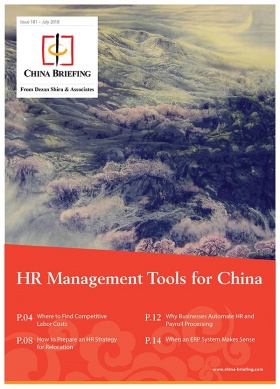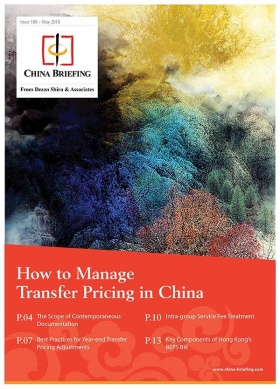If Your China Lawyer is Continually Billing by the Hour, They Haven’t Updated Their IT.
Op/Ed by Chris Devonshire-Ellis
One of the issues driving professional service practices in today’s digital world is information technology (IT). Of the two main professional spheres, namely, law and tax/audit, the latter firms have typically been at the forefront of these developments as they analyze huge volumes of financial data.
At Dezan Shira & Associates, which is essentially a hybrid firm with its feet in both camps, IT has been on our radar for years. The days of accounting firms having desks full of glasses-wearing accountants and number crunchers have long gone, with sophisticated software now
taking over many of the mundane tasks.
Examples can be found within our payroll services division, which can calculate down to the nearest fen (a fraction of a Chinese RMB Yuan) within seconds a company payroll comprising several thousand employees and then produce the relevant statutory reports at the click of a button.
Our tax and audit divisions have also long made use of software to analyze financial statements; for example, we can scan expense receipts received from employees of our clients and distinguish whether they are valid or not. These functionalities are achieved via the MS-AXD ERP system, a Microsoft software configured by the firm’s own software developers and related third-party apps, which connect to it.
For the future, AI software is catching on. AI analyses historic data and uses that to predict. That’s a useful tool when wanting to visualize what happens to a business model under various types of scenarios.
One good example might predict what would happen to the bottom line of a business manufacturing in China and exporting for sale in the US, if tariffs on exports from China to the US were extended further in the coming months. AI can analyze the entire data set of a business, facilitating a more thorough examination. What would have taken hours to compute can be done in minutes.
IT is also impacting the way legal contracts are drawn out. For instance, when drafting a contract, the entire history of all amendments within the process of creating a contract – from conception through to completion – can be crystallized into a blockchain that cannot be manipulated by a single party.
This will provide more confidence to contracting parties than the traditional “track changes” functionality available on word processing software. Contract bots are also being deployed, which can ease the repetitive workload from lawyers during contract reviews. These bots can scan a contract in a matter of minutes and can flag or make corrections and amendments as necessary.
While it is always useful to have your China lawyers or consultants sit down and give you professional (read: experienced) advice, it is no longer necessary for your lawyers to be charging you by the hour for extended contract reviews. If they are, they are out of date and not investing in their own practice. If that is the case, then their credibility over investing time and relevant expertise into their client’s business operations can justifiably be called into question.
Firms such as Dezan Shira now also provide ERP and software development services for our own clients. We are regular attendees at IT conferences, and keep improving our own practice in terms of IT development, besides assisting clients by overseeing their own IT updating.
These initiatives should have the effect of reducing man operational hours, freeing up legal, tax, and business expertise instead of spending hours on contractual or accounting paperwork – and then billing the client for the privilege.
Another important area of IT in professional service firms is Customer Relations Management, or CRM. This is vital from both the client side – managing details of all the clients’ needs, interactions, and billing, as well as the practice development side, where collective client data can be used to spot trends and identify opportunities.
Dezan Shira has recently implemented the MS Dynamics CRM and synchronized its extensive data set within its existing AXD ERP system. This combined system allows the firm to understand the business, customers, and opportunities in a more structured and holistic manner than was previously possible.
Most of these changes have only come onto the scene in the past few years, and the pace of change continues to accelerate. It is a challenge for many firms, especially those in Asia, where the transition from an almost exclusively “manual” approach has occurred in a very short space of time.
The more forward-looking firms in the market which have had the ability and confidence to invest in IT will possess considerable advantages as they continue to build on the base they have put in place over the coming years.
About Us
China Briefing is produced by Dezan Shira & Associates. The firm assists foreign investors throughout Asia and maintains offices in China, Hong Kong, Indonesia, Singapore, Russia, and Vietnam. Please contact info@dezshira.com or visit our website at www.dezshira.com.
- Previous Article Myanmar’s Economic Zones, Remitting Profits from India, Vietnam’s Young Consumers – China Outbound
- Next Article How to Get a Shenzhen Hukou








